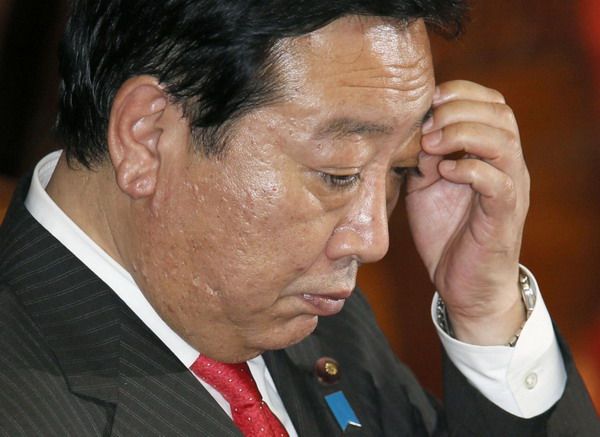
TOKYO - Japan's opposition-controlled upper house passed a censure motion on Wednesday against Prime Minister Yoshihiko Noda, piling more pressure on him to make good on the promise to call an early election "soon".
 |
|
Japan's Prime Minister Yoshihiko Noda attends a plenary session of the upper house at the parliament in Tokyo, in this photo taken by Kyodo August 29, 2012. [Photo/Agencies] |
The reprimand is non-binding, but effectively means that the opposition will stop cooperating with the government on most bills, including key ones on deficit financing and voting reform that need opposition votes to pass.
The motion passed easily, with 129 votes in favour and 91 ?against. Jeers rang out in the chamber as members derided the prime minister's foreign policy and demanded to know when he would call the election.
Noda promised this month to call an election to parliament's lower house as the price for opposition support for his plan to raise the sales tax to offset rising social security costs.
But to the growing frustration of his rivals, he has since been coy on the timing of the vote and last week brushed off as speculation reports that he had suggested a November date in his talks with opposition leaders.
No one expects the parliament to serve its full term that ends in August 2013, but many of Noda's Democrats want to push back the vote as opinion polls show they would lose badly.
By threatening to stall the bill that the government needs to cover the bulk of its fiscal deficit and 40 percent of all spending, the opposition hopes to finally win his unequivocal commitment.
Five months into this fiscal year, the government has made do by dipping into reserves and making other adjustments. But Finance Minister Jun Azumi has warned that the government could run out of cash by early October if the bill fails to pass. ?
In its censure motion that it later merged with one submitted by smaller parties, the main opposition Liberal Democratic Party accused Noda and his government of incompetence in handling state matters.
In particular, it called recent territorial spats with South Korea, China and Russia a "national crisis" caused by incoherent foreign policy.
One opposition member said Noda's policies had contributed to a loss of trust in the government.
The opposition New Komeito party originally supported the motion but boycotted the vote because it felt it ran counter to an earlier agreement to cooperate with the Democrats to raise taxes and reform the welfare system.
The Democrats on Tuesday passed the deficit-financing bill in the lower house they control and an election reform bill to correct a bias that favours rural districts. However, the opposition boycotted both votes, signalling the bills had little chance of clearing the upper house.
Snap Poll
Several ruling party and opposition lawmakers have suggested that Noda would probably wait out the stalemate until the current parliament session ends on Sept 8 and call a snap vote during an extra session in October to secure the bills' passage.
An election is likely to end the Democrats three-year rule, though opinion surveys suggest the poll may fail to produce clear winners, given the high percentage of undecided voters and general disillusionment with mainstream parties.
The Democrats, a mix of conservatives, centre-left lawmakers and ex-socialists, swept to power in August 2009, pledging to change how Japan was governed after more than 50 years of almost non-stop rule by the conservative LDP.
Three years and three prime ministers later, critics say the Democrats have largely failed to deliver on promises to reduce bureaucrats' control over policymaking and pay more heed to families.
The party has also suffered defections over the tax increase and is divided as Noda tries to devise a national energy policy amid a growing anti-nuclear clamour after last year's Fukushima atomic disaster.